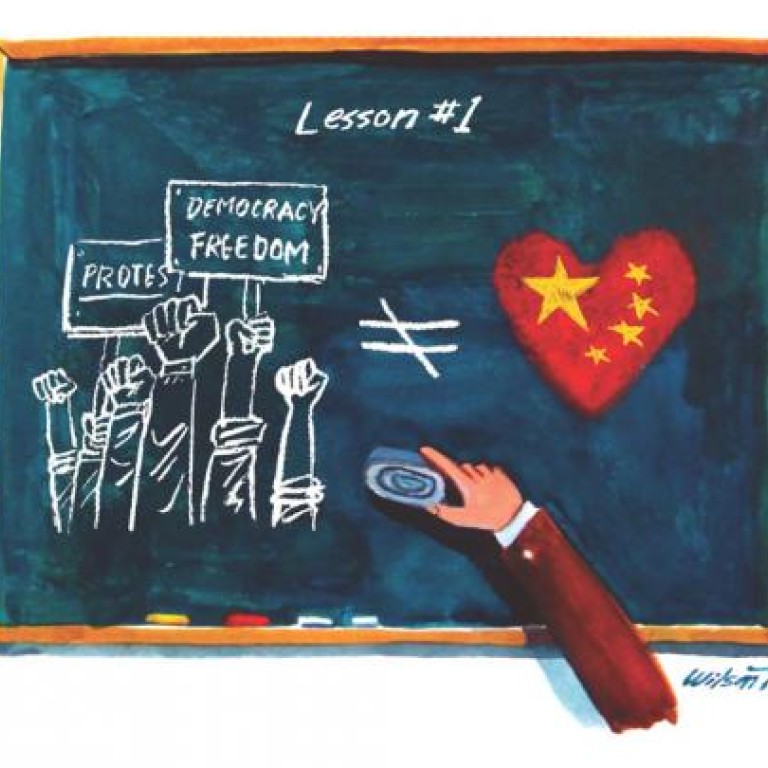
Patriotism, Hong Kong style
Kerry Kennedy says the government would see the flaws of its national education curriculum if it understood that Hongkongers' love for China goes hand in hand with their embrace of liberal values
The debate on national education continues to polarise the community. Even though Anna Wu Hung-yuk's implementation committee has provided a way out for the government by declaring the curriculum guide for moral and national education unnecessary, the chief executive hesitates to take the final step and withdraw it.
Yet once the Legislative Council resumes, national education will again become the focus of public attention. Newly elected legislator Ip Kin-yuen is already threatening to move a motion calling for the resignation of Secretary for Education Eddie Ng Hak-kim for his mishandling of the issue. So, what can be learnt?
In the first place, don't take the school curriculum for granted. It is not a neutral body of knowledge. Rather, it contains values that the community considers important. Forget this way of thinking about the curriculum and the clashes seen over national education will continue.
These are clashes about what is valued as part of young people's education. It is the government's role to ensure that such clashes are minimised. This carries a key lesson for the government about the importance of consultation.
Consulting the community and understanding its concerns is a key expectation of government. The current government can be forgiven for thinking that the consultation on national education had been completed when it came to office. What was missing from this consultation was the now infamous "China model" handbook for schools extolling the Chinese Community Party as "progressive, altruistic and united". Thus, the original curriculum was no longer the issue for the Leung Chun-ying government: pro-Beijing influences on national education became the issue.
At this point, the implementation of national education should have been suspended and a new round of consultations commenced. Student and parent groups found a cause that the government failed to understand. This lack of understanding meant that the aspirations of students in particular were underestimated.
The lesson is clear: as Sun Tzu advised, "Know your enemy". It was clear from the actions of the so-called "post-80s" students that young people in Hong Kong are very willing to adopt political action, to the point of engaging in illegal protests (remember the siege of the former Legislative Council building during debates on the train link from Guangzhou to Hong Kong). In the same way, the Tamar protesters, who seemed to contain a large group of "post-90s" students, resorted to protest as the only form of available political action.
In this context, it is important to remember that these students are the products of Hong Kong's education system, they come from Hong Kong families and many of them will go to Hong Kong's universities. They are Hong Kong, and they are for Hong Kong. But they are also Chinese.
It is a mistake to believe that because young people support Hong Kong's core values related to democracy and human rights, this makes them anti-China. They may well be opposed to the Chinese Communist Party, oppression and corruption. But these are not China; they are aspects of China's political system. As one of the young protesters put it, "you learn to love China from the heart, not the classroom".
This is the major point that has been missed when national education tries to channel students' love for their country into several lessons a week, assuming that young people are so disaffected they need to be told why and how they should love their country.
Yet, parallel to the Tamar protests have been displays of nationalism related to the Diaoyu Islands with a radical democrat like Leung Kwok-hung playing a leading role in supporting Chinese territorial claims. Loving Hong Kong and loving China are not mutually exclusive and such an amalgam probably reflects the feelings of many Hong Kong people.
This has been achieved with a "soft" approach to "national education" since 1997 and relatively apolitical approaches to civic and moral education under the British. Thus, for Hong Kong youth, loving China and supporting democracy can be equally held values. If policymakers don't appreciate this, they will continue to push a "hard" line on national education, with students and many in the community continuing to resist. The government needs to accept that many people's love for China is love with a critical edge, patriotism influenced by liberal values.
The role of government in a society that aspires to democracy is to act on behalf of citizens. But, first, governments must listen; second, they must be equipped with knowledge and understanding of the issues; and, third, they must act wisely in response.
If the Leung government can learn these lessons, then the Tamar student protests will have marked an important step in the process of Hong Kong's democratisation.

